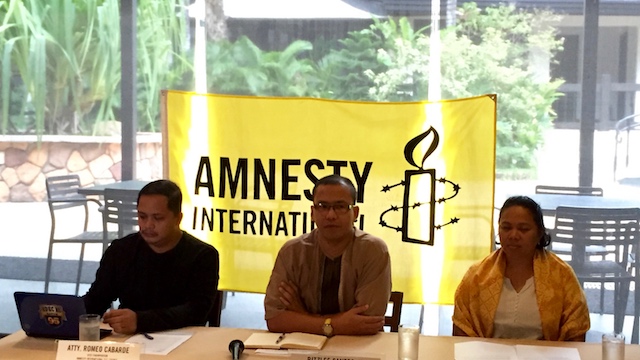
MANILA, Philippines – With president-elect Rodrigo Duterte vowing to reimpose the death penalty for his war against crime, Amnesty International (AI) Philippines warned that this would mean that the country will be reneging on an international commitment against capital punishment.
In a press conference on Friday, May 20, the group's vice chairperson Romeo Cabarde said that it would be a "shame" for the Philippines – the first Asian country to abolish the death penalty – to consider reimposing it.
"What kind of face are we going to show to the rest of the world, having promised at a certain point that we will commit to the revocation of the death penalty? Here comes a new leader who will reimpose the death penalty just because he wants to curb criminality in the country," Cabarde said.
The Philippines was the first Asian country to abolish death penalty under the 1987 Constitution, but it was re-imposed during the Ramos administration to address the rising crime rate.
During the Arroyo administration, the Philippines signed the Second Optional Protocol to the International Covenant on Civil and Political Rights, aiming at the abolition of the death penalty.
In his first press conference since topping the presidential race, Duterte – known as "The Punisher" for his iron-fisted rule as mayor of Davao City – vowed to make good on his promise to reinstate the death penalty as part of his hardline stance against crime.
Duterte said he would urge Congress to restore death penalty by hanging, and added that he wants to give security forces "shoot-to-kill" orders against criminals who violently resist arrest.
The Davao mayor ran on a successful campaign strategy of pledging to stamp out crime within 3 to 6 months of his presidency.
But for Amnesty, reviving death penalty won't be a successful deterrent against crime, citing various studies conducted in different parts of the world.
Cabarde said that strengthening law enforcement, imposing reforms in the judiciary, and providing for citizens' basic needs are much more effective to stop the commission of petty crimes.
He added that pushing for capital punishment is almost tantamount to admitting the failure of the country's law enforcement framework.
"The more he pushes for death penalty, the more there is an implied admission that law enforcement isn't working in the Philippines, [that] the judiciary isn't working in the Philippines. So if that's the root cause of criminality, then I think we have to hit the target at its very root," he said.
Major concerns
Aside from opposing Duterte's planned revival of capital punishment, Amnesty also called on the president-elect to make human rights central to his platform of governance.
"It's a must for Duterte to recognize government's obligation to uphold human rights, not only in words but policies," said AI Philippines chairperson Ritz Lee Santos III.
"The mayor seems to be very vocal on his counter-progressive programs and plans...This is not a joke. Human rights is personal, human rights is a serious matter," he added.
AI Philippines urged Duterte not to undermine the rule of law.
In its program of action on human rights for the incoming Duterte administration, the group outlined 4 major concerns:
- Strengthen and respect the independence and mandate of constitutional bodies that ensure government accountability in the full protection of human rights
- Ensure full protection of human rights in the administration of justice
- Ensure that human rights is embedded in the peace process, and prevent the use of counter-insurgency and counterterrorism to justify human rights violations
- Ensure full protection of the marginalized and disadvantaged sectors
"Putting an end to extrajudicial executions, unlawful arrests, secret detention, enforced disappearances, torture and other ill-treatment is one of our non-negotiables for President Duterte," Santos said.
Cabarde added: "In order for the incoming leadership to legitimately convey its assertions towards meaningful change in the country's situation, it is essential that it prioritizes the strengthening of the mandate of constitutional bodies that ensure government accountability. Policies that enable the culture of violence and impunity must be reviewed, not reinforced."
'Regressive' policies
For its part, the Center for Media Freedom and Responsibility (CMFR) also joined the opposition, saying that the use of death penalty in the past "did not see the end of lawlessness."
"More and more countries have rejected capital punishment, as studies have questioned its usefulness in deterring crime as well as its role in the making of such tragedies as wrongful executions," it said in a statement on Friday.
CMFR added that such "inhumane" forms of punishment would apply mostly to the poor because of gaps in the justice system.
"The Duterte campaign boasted that it would bring change. But the shoot-to-kill order and prioritizing the restoration of capital punishment are regressive steps, taking us all back to a situation when state intervention only made bad things even worse," CMFR added.
Meanwhile, some of the newly-proclaimed senators also voiced their opposition to Duterte's proposal, including senator-elect Leila de Lima, who was a former chairperson of the Commission on Human Rights.
Others, such as senators-elect Joel Villanueva and Manny Pacquiao, supported the proposal, but with reservations. (READ: Newly-elected senators: Can they work with President Duterte?)
Duterte has made no secret of his plan to kill criminals as part of his vow to stamp out crime within 3 to 6 months. But he earlier said that his bad human rights record was only a "political gimmick" of his opponents.
The mayor has gained notoriety over the alleged extra-judicial killings perpetrated by his so-called "Davao Death Squad." More than 1,000 people were alleged to have been killed during Duterte's tenure in Davao City.
Human Rights Watch earlier called for an investigation into Duterte's alleged involvement in these killings. – Rappler.com